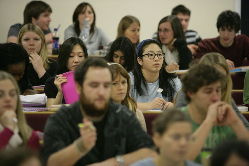History > Globally-oriented curriculum
Prospective Undergraduate Students:http://www2.warwick.ac.uk/fac/arts/history/undergraduate/admissions
-
They claim 'studying at warwick is truley an international experience.'
- They claim that modules introduce students to 'history around the globe'.
- That there is ample opportunities for foreign study and the department encourages foreign languages.
- Staff conduct research into foreign languages and have studied themsleves at foreign institutions.
Evidence for these above points can be found on history website.

(1.) Modules = 'History Around The GLOBE.
From analysis of the module pages for each year one can see there is a huge range of option modules that cover different areas of the globe. For example,
Gandhi and Indian Nationalism (HI161)
Latin America: Themes and Problems (AM101)
Galleons and Caravans: Global Connections 1300-1800 (HI163)
More examples may by found at,
Modules for First Year Study: http://www2.warwick.ac.uk/fac/arts/history/undergraduate/year_1_index/modules_1
Modules for Second Year Study: http://www2.warwick.ac.uk/fac/arts/history/undergraduate/year_2_index/modules_2
Modules for Third Year Study: http://www2.warwick.ac.uk/fac/arts/history/undergraduate/year_3_index/modules_3
- First Year Core Modules: Making of the Modern World
Aims and Objectives: http://www2.warwick.ac.uk/fac/arts/history/undergraduate/modules/hi153/aims/
-
The course aims to study historical processes on a ‘world-wide scale’, moving away from a ‘euro-centric’ approach to history.
Making of the Modern World Timetable: http://www2.warwick.ac.uk/fac/arts/history/undergraduate/modules/hi153/timetable/
-
By looking at the Timetable for the course, one can see that students study, France, Russia, America, China, India to name a few countries.
The Group Project: http://www2.warwick.ac.uk/fac/arts/history/undergraduate/modules/hi153/group_project/
-
As part of the assessment students complete a group project, by analysing the titles of these it may be concluded that students are encouraged to study a variety of events from a round the globe.
-
Students may study films depicting events in Africa, Russia, Italy, Argentina or America. Or they may historically compare Europe and China. Moreover, many of the questions are broad and merely ask for a ‘global’ view of a particular topic such as ‘poverty’ or ‘communal violence’.
(The following core modules only apply for Single Honours students)
- Second Year: The European World 1500-1720
Module Details and Regualtions: http://www2.warwick.ac.uk/fac/arts/history/undergraduate/modules/hi203/details
(2.) Opportunity for Foreign Study and Learning Foreign Languages
Language Tuition: http://www2.warwick.ac.uk/fac/arts/history/undergraduate/admissions/languages/
-
All History students at Warwick must take 4 modules, one of which must be a European language (German, French, Spanish or Italian).
The Venice Programme: http://www2.warwick.ac.uk/fac/arts/history/undergraduate/international/veniceprogramme
Studying Abroad: http://www2.warwick.ac.uk/fac/arts/history/undergraduate/international
-
Single honours students are able to utilize their language study by participating in the Erasmus scheme and study at a varity of European Universities including, the Universities of Berlin, Darmstadt and Oldenburg in Germany, the University of Seville in Spain, the University of Turin in Italy and the University of Clermont-Ferrand in France.
-
-
For single honours and joint-degree students there is the possibility of foreign exchange spending the second year in North America.
(.3) Academic Staff
Academic Staff: http://www2.warwick.ac.uk/fac/arts/history/people/staff_index
- 45% of the academic staff at Warwick studied at a foreign university, ranging from universities in America, Europe and New Zealand.
